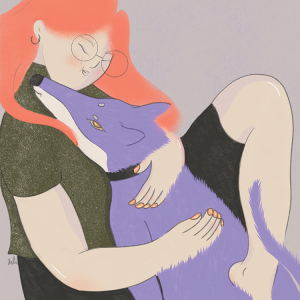Research Finds Dogs With More Human and Animal Buddies Live Longer
A new study suggests that spending time with your pup isn’t just a way to avoid making plans; it’s great for their health.

share article

Your pet wants you to read our newsletter. (Then give them a treat.)
This is a safe space, so I’ll be honest: I have no idea the last time I made myself a doctor’s appointment. If I’m being doubly honest, it was probably during the Obama administration. Alternatively, I will (and haveopens in a new tab) immediately bring my dog to the emergency vet if I think she might be sneezing too hard. The point here is that pet parents care deeply about their animal’s health, occasionally more than our own.
So, whenever new information emerges on how to improve their longevity and quality of life, it’s worth a look. The most recent development in this space is a studyopens in a new tab that suggests improving a dog’s long-term health could be as simple as having other animals and people around to hang out with.
Led by Dr. Noah Snyder-Mackler, an associate professor at the School of Life Sciences, Arizona State University (ASU) researchers examined the effect a dog’s social environment can have on their health and aging. It’s not a surprising proposition when you consider the fact that medical professionals have long warned of the detrimental impact isolation can have on human health — only natural that this influence would extend to our canine companions as well. In fact,the CDC linksopens in a new tab loneliness with a significant increase in risk of anxiety, depression, suicide, dementia, and premature death. Coming off the heels of the COVID-19 lockdown, it has now reached epidemic levelsopens in a new tab.
Do dogs cheer up if they have friends?
To combat the mental drag of being alone, many experts recommend adopting or fostering a dogopens in a new tab. Dr. Snyder-Mackler set out to determine whether this remedy also persisted the other way around. “Social connectedness — the quality and quantity of our friendships — is one of the components of our social environment that can have a strong impact on our health and well-being. And this link between our social environments and our health extends to many social animals,” he explains to The Wildest.
However, this effect had never been studied on household pets. “Animals with stronger social relationships live longer, healthier lives. But how this relationship might extend to animals that live in our environments, that we control, was still unclear,” Dr. Snyder-Mackler continues.
Specifically, Dr. Snyder-Mackler and his team examined surveys from over 21,000 pet parents with at least one dog. They were asked questions about their pet’s physical activity, environment, behavior, diet, medications, and health status, as well as a few regarding their own demographics. Researchers then used these results to determine the key factors that appeared to influence a dog’s social environment and well-being overall. Ultimately, the team zeroed in on neighborhood stability, total household income, social time with adults and children, social time with other animals, and the age of their pet parents as the primary elements.
A dog with buddies is a healthy dog
After analyzing this data, the researchers determined that social support — from either human or animal sources — was the most significant factor toward overall health. And it wasn’t particularly close either; companionship proved to be five times more impactful than household income and demographics. ASU PhD student and a coauthor on the study, Brianah McCoy, tells The Wildest that this finding was equal parts surprising and encouraging — not to mention a bit reassuring. “So having a friend around really matters, which I am sure we can all relate to,” she adds.
That’s not to say all forms of social interaction produced the same positive effect on canine health. Similar to a trip to Vegas or IKEA, it doesn’t seem helpful to have kids aroundopens in a new tab. To be exact, Dr. Snyder-Mackler’s team clocked a negative association between the number of children in a household and their dog’s health. Conversely, dogs living with adults seemed much healthier; this was especially true with younger pups. This really backs the notion of respecting your elders, a firm belief I’ve long held and something that is in no way a response to my recent foray into my 30s.
As for what causes this age disparity, another coauthor Layla Brassington points to household resource and attention allocation as the primary culprit. “Older owners, on average, tend to have more stable environments and more free time to spend with their dogs. Pet parents that also have human children just have less time for their furry children than pet parents that don’t have human children,” the ASU graduate student says.
There is one major caveat to all this. Just as some people love hitting the bars to mingle with strangers while others would rather stay home to binge The Bear, dogs can also have varied personalities. And some are introverts. “Not all dogs enjoy and/or benefit from being in social situations with other animals and may prefer to spend time with their human parents,” Brassington explains.
About the Dog Aging Project
ASU’s study is part of opens in a new tab, a large-scale community science endeavor led by the University of Washington and Texas A&M. With the help of a dozen other institutions, including ASU, the project has, so far, collected data from over 45,000 registered dogs to better understand how genetics, lifestyle, and environment influence canine aging and disease. Moving forward, the researchers believe these results could be used to further identify areas related to social environments that enhance the wellbeing of pets, as well as their humans.
“Dogs are often considered our closest animal companions and share many aspects of our daily lives. By studying how the social environment affects dog health, we can gain insights that may also be relevant to human health,” McCoy says.
For right now, she adds that these results, at a minimum, indicate that many of our pets can benefit from increased socialization. Still, like most things, having extra money would make their lives a lot easier. Per McCoy, this should be pet parents’ overall takeaway from the study:
“Having a good network, having good social connectedness is good for the dogs that are living with us. But the structure and equities that are in our society also have a detrimental effect on our companion animals as well. And they are not the ones thinking about their next paycheck or their health care.”

Sean Zucker
Sean Zucker is a writer whose work has been featured in Points In Case, The Daily Drunk, Posty, and WellWell. He has an adopted Pit Bull named Banshee whose work has been featured on the kitchen floor and whose behavioral issues rival his own.
Related articles
![Australian shephard and Corgi mix play fighting outside]() opens in a new tab
opens in a new tabTurns Out Humans Kind of Suck at Recognizing the Signs of Dog Aggression
A PSA to pay better attention to our best friends’ body language.
![]() opens in a new tab
opens in a new tabTo Cry Is Human — and Apparently Canine
Time to whip out The Notebook for a little doggy movie night.
![Brown, half breed dog sitting on a chair next to his owner, a blonde stylish woman wearing a brown smart suit.]() opens in a new tab
opens in a new tabYour Dog Can Read Your Mind, Kind Of
Researchers say dogs actually have a pretty good sense of what we’re thinking.
![Older dog playing with ball in a green field]() opens in a new tab
opens in a new tabDog Arthritis Treatment: How to Relieve Arthritis Pain in Dogs
Tips for treating achy joints — from medications to massages.
- opens in a new tab
Glucosamine for Dogs: Everything You Need to Know
You may have heard other pup parents praising this supplement. Here’s what a vet has to say.
![Illustration of a woman hugging a dog]() opens in a new tab
opens in a new tabIs That...Stress Your Dog Smells?
A 2022 study finds that your pup can tell — er, smell — when you’ve been doom-scrolling.









